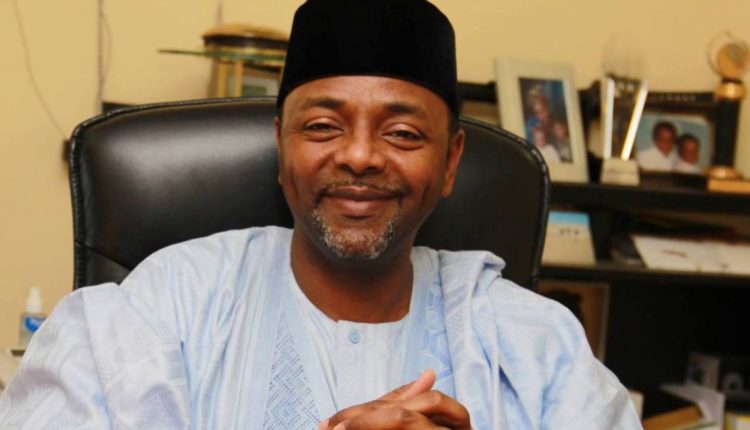The final resolution of the OPL 245 controversy now depends on a proposal by the Economic and Financial Crimes Commission (EFCC) for a compensation to Mohammed Abacha, son of former head of state.
The development of the oil block, described as one of Africa’s richest, has been stalled since President Muhammadu Buhari came to office in 2015.
The younger Abacha is laying claim to the ownership of Malabu Oil & Gas Ltd, the company originally awarded the oil prospecting licence (OPL) in 1998 by Sani Abacha, his father.
It later emerged that Dan Etete, Abacha’s minister of petroleum, also had an interest in the company.
The licence was revoked by President Olusegun Obasanjo in 2001 in a matter unrelated to Etete’s interest in Malabu.

After a prolonged legal tussle following the revocation, Obasanjo agreed to an out-of-court settlement in 2006 to restore the block to Malabu and this was affected by President Goodluck Jonathan in 2011.
Shell and ENI then acquired full rights to OPL 245 in a $1.3 billion deal brokered by the Nigerian government.
Foreign watchdogs later raised issues with the 2011 settlement, alleging that it was fraught with fraud.
However, all subsequent criminal and civil cases in Italy and the UK have returned a verdict of “not guilty” on the oil companies and other accused persons.
Read Also: Atiku: My Parents Are From Sokoto, Jigawa
But the Buhari government refused to convert the OPL to an oil mining license/lease (OML) for the Etan and Zabazaba fields being developed by ENI.
This is believed to have stalled the addition of hundreds of thousands of barrels to Nigeria’s current oil production, thereby denying the country the windfall from high crude prices caused by the Russia-Ukraine war.
‘ABACHA IS THE ACTUAL SHAREHOLDER’
Buhari, in an attempt to break the OPL 245 impasse, recently approved that it should be converted to a mining license for production to commence.
In the 2022 terms of engagement “without prejudice” discussion between Nigeria and ENI, EFCC was asked to discontinue pending litigation in Nigeria against the oil company and all issues were to be resolved.
A team made up of officials of the ministry of petroleum resources, ministry of justice, Nigeria Upstream Petroleum Regulatory Commission (NUPRC) and the EFCC was constituted to examine all the related issues and advise the anti-graft agency on the way forward.
However, the EFCC objected to the proposal to convert the OPL to OML and for the court case to be discontinued, saying it “did not consider the interest of the actual shareholders of the Malabu Oil and Gas Limited (Mohammed Sani Abacha and Pecos Energy Limited) culminating in the various litigations regarding OPL 245. This action has globally undermined the image of the Federal Republic of Nigeria”.
The EFCC requested the release of the team members “for the continuation of the assignment”.
The Cable learnt that EFCC is proposing that ENI should set aside $500 million from the proceeds of production to compensate Abacha.
The oldest surviving son of the former head of state said he owned Malabu but that his name was fraudulently removed as a director in the incorporation documents at the Corporate Affairs Commission (CAC).
In a case filed in court by the EFCC against Malabu, Shell, Eni, Mohammed Bello Adoke (former attorney-general of the federation), Aliyu Abubakar, Etete, and Rasky Gbinigie (Malabu’s company secretary), the commission is alleging that they colluded to remove Abacha’s name as a director of Malabu.
According to reports, a man named “Mohammed Sani” originally had 50 percent in the company, with “Kweku Amafegha”, believed to be a pseudonym for Etete, owning 30 percent; and Wabi Hassan, the wife of Hassan Adamu, Nigeria’s then-ambassador to the US, was credited with owning 20 percent.
Read Also:$1.1b Malabu Oil Bribes: Swiss To Reveal Nigerian Beneficiaries
Mohammed Abacha, who is EFCC’s key witness, told the court that he was the “Mohammed Sani” but admitted that he did not pay for the shares either in cash or by any other means.
The case is ongoing.
‘EFCC PERSECUTING ME ON BEHALF OF THE ABACHA FAMILY’
Adoke, who was the attorney-general when the settlement was executed in 2011, has always strenuously denied allegations of fraud and bribery.
He said the EFCC has been persecuting him at the behest of the Abacha family.
In an interview with The Cable in 2017, Adoke alleged that after the OPL 245 settlement was finalized, a lawyer representing Mohammed Abacha asked him to stop the payment of $1.1 billion to Malabu because of the controversy over ownership.
Adoke said he told the lawyer it was a shareholders’ dispute that should be settled in court and had nothing to do with the office of the attorney general.
He also said even if Abacha had shares in Malabu, he was under obligation to forfeit them to the federal government.
“By virtue of Decree No 53,” Adoke said, “the (Abacha) family had forfeited all identified assets to the federal government. In fact, all undeclared assets were also forfeited.
“People should ask if in a decent country, the children of Abacha could come out openly to say ‘we own OPL 245’ when the oil block was awarded by their father. Should they have been so confident to lay that kind of a claim?
“Why has the EFCC not gone after them to ask how they acquired interest in OPL 245? If not that the political environment is conducive for them, they wouldn’t raise their head to be making such claims.”



Comments are closed.